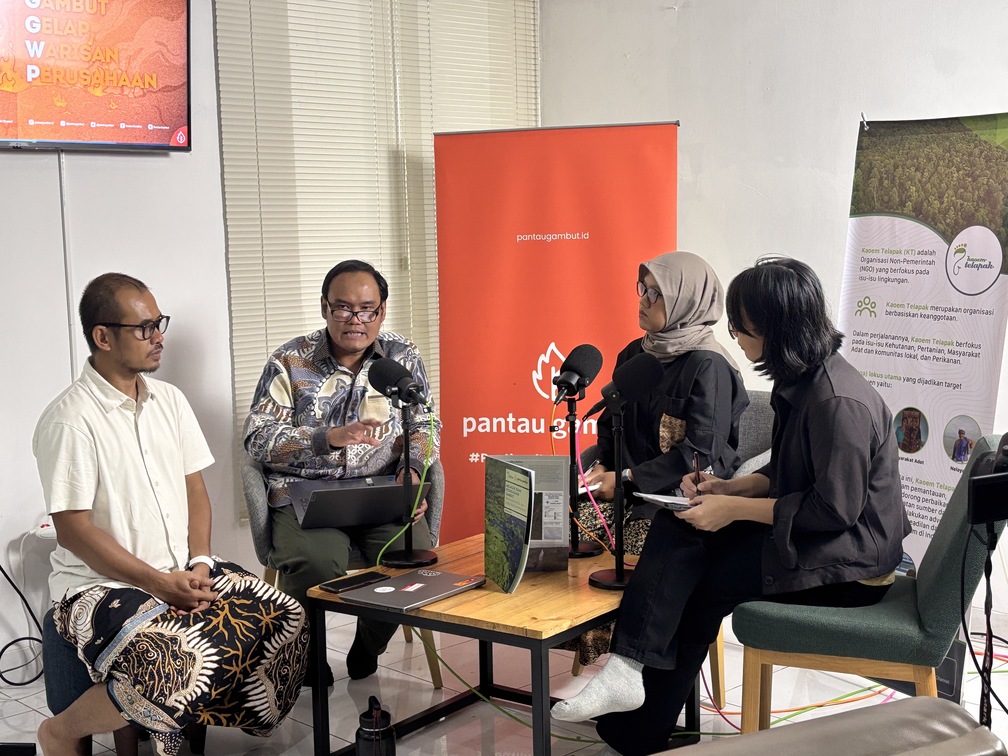Whitewashing Illegal Palm Oil Corporation: A Poor Practice in Palm Oil Governance Aggravating Environmental Crimes
By AdminUnveiling the Collaborative Study by Pantau Gambut & Kaoem Telapak

This study highlights the key issues surrounding threats to Indonesia’s peatlands, particularly due to land-use changes and forest fires. It also explores the challenges of implementing climate and environmental regulations at both national and international levels.
The history of peatland degradation in Indonesia reveals the extreme vulnerability of this ecosystem to excessive human exploitation. Large-scale land clearing for the timber and plantation industries, overlapping land claims, and even National Strategic Projects (Program Strategis Nasional/PSN) such as the Food Estate program have all contributed to this ongoing crisis. Currently, 9.5 million hectares of peatland ecosystems are under the control of palm oil plantations, logging concessions, and industrial timber plantations (Hutan Tanaman Industri/HTI).
Beyond their crucial role in global climate change mitigation, peatlands are unique ecosystems rich in biodiversity. Wahyu Perdana, Advocacy and Campaign Manager at Pantau Gambut, emphasized that peatlands can store up to 30% of the world's total soil carbon reserves.
"This makes them one of the most significant natural carbon sinks, supporting the livelihoods of Indigenous peoples and local communities, especially those who depend on natural resources surrounding peatlands," he explained. Wahyu added that findings from Pantau Gambut and Kaoem Telapak reveal serious threats to the peatland ecosystem.
A study on three concessions in Central Kalimantan reveals poor peatland ecosystem governance. This condition highlights the government's lack of commitment to peatland protection and law enforcement. On the other hand, this case study re-evaluates the regulations of the Indonesian Sustainable Palm Oil (ISPO) and the European Union Deforestation-free Regulation (EUDR), emphasizing the importance of a more in-depth approach to peatland ecosystem protection.
According to the study, ISPO certification in the field still faces serious challenges, such as weak regulatory enforcement and corporate practices that do not comply with ISPO principles and criteria as stipulated in Minister of Agriculture Regulation No. 38/2020.
Meanwhile, for EUDR, the limitation lies in the definition of "forest" used. Land areas of more than 0.5 hectares with trees at least five meters high and a canopy cover of over 10% seem to overlook specialized ecosystems such as peatlands. In fact, peatlands play a crucial ecological role but are not adequately accommodated under this definition.
Ziadatunnisa Latifa, Campaigner at Kaoem Telapak, stated that by analyzing the weaknesses in existing regulations, it is hoped that concrete recommendations can be provided to strengthen peatland protection. "This is to ensure that Indonesia can fulfill its commitment to global climate change mitigation and prevent large-scale deforestation in the future," said Zia.
Furthermore, the study reveals non-compliance practices among palm oil plantation companies with existing regulations. This applies both nationally and internationally, particularly in the context of peatland management. The case study in Central Kalimantan found that three companies—PT Agrindo Green Lestari, PT Citra Agro Abadi, and PT Bangun Cipta Mitra Perkasa—were proven to have engaged in deforestation and the conversion of protected peatlands into oil palm plantations.
One such case is PT Citra Agro Abadi (PT CAA), which planted oil palm trees in a peatland area designated for environmental protection. This area should not have been utilized for commercial activities. This violation not only causes environmental damage but also negatively impacts Indigenous communities that depend on the peatland ecosystem for their livelihoods.
Additionally, PT Bangun Cipta Mitra Perkasa, which has a history of recurring land fires since 2015, was also reported to have land tenure conflicts overlapping with the Food Estate project.
Concrete efforts to protect and preserve peatland ecosystems require a multi-faceted approach. “This includes strengthening regulations and law enforcement related to oil palm plantation management on peatlands, providing space for community participation in regulatory improvements, enhancing coordination among ministries and agencies involved in peatland ecosystem management, advocating to palm oil consumer countries about the vulnerability of peatland ecosystems, including through the implementation of sustainable palm oil certification such as ISPO, and reinforcing regulations like the EUDR,” Zia concluded.



